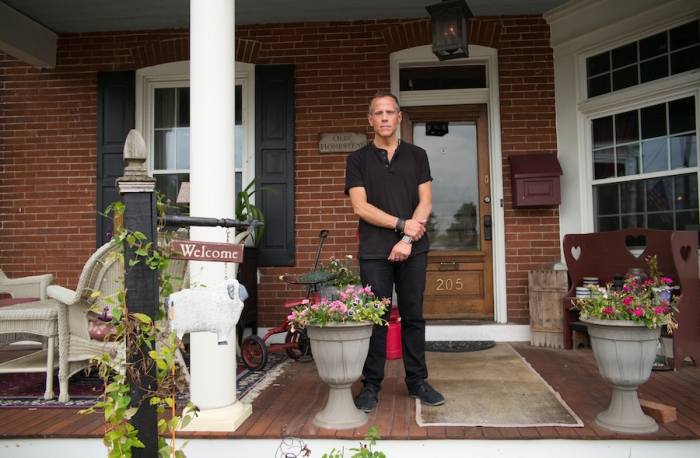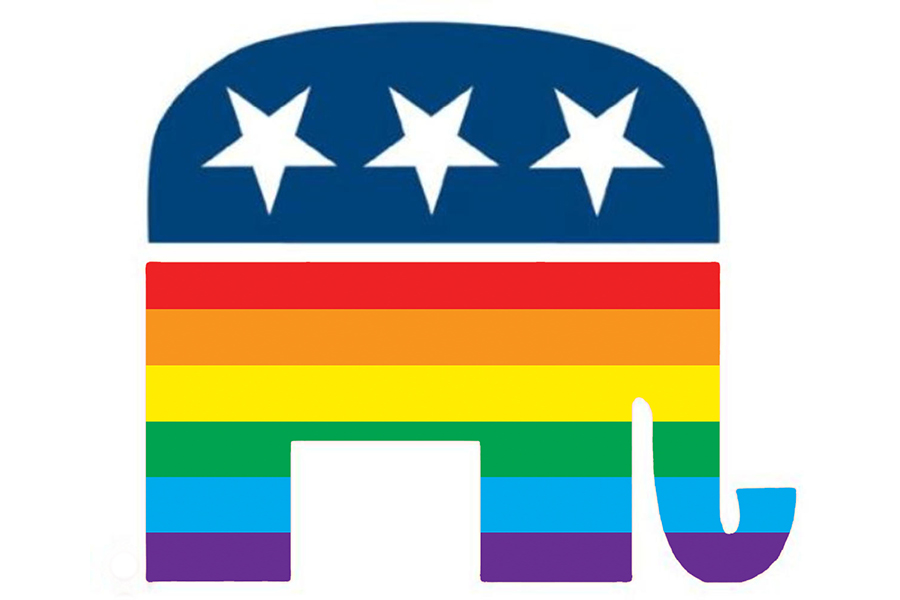Gary Klinger is a man without a country. He is a Lancaster County Republican, and he is gay. Being a Republican in a red county works well, but being gay in the Republican Party, not so much.
“I don’t hide that I’m gay, but I don’t advertise it,” he said.
With the burst of protests against the Trump administration following the 2016 election and the strong political element in gay Pride celebrations this year, one might be forgiven for thinking that to be gay is to be a Democrat. Not so fast. There are gay Republicans who help to make red states crimson. Some of them supported Donald Trump and are likely to do so again.

GARY KLINGER Photo: Timothy Roberts
According to exit polling reported by NBC News, 14 percent of self-identified gay voters cast a vote for the New York real-estate developer who had been endorsed by the Ku Klux Klan. The percentage was down from 2008, the year that Barack Obama was elected, when 27 percent voted for Republican John McCain. According to the Log Cabin Republicans, a gay political organization, the gay Republican vote peaked in the mid-term elections in 2010 when 31 percent of gay voters chose Republican candidates.
“This is not an insignificant number,” said Gregory T. Angelo, president of the Log Cabin Republicans. “We are more diverse in our political leanings than other groups underrepresented in GOP politics.”
It should be noted that the Log Cabin Republicans withheld their presidential endorsement last year because Trump was such an unknown on political matters. Since then, Angelo has been trying to work with the administration on a number of issues.
“I’m optimistically cautious that closer to 2018 and 2020, LGBT people who looked at [Trump] with suspicion might reconsider,” he said.
It has been 40 years since Log Cabin was founded by people who had come together to fight the Briggs Initiative in California, which would have banned gay and lesbian teachers. The Log Cabin Republicans went on to be a voice for gay marriage at a time when the left opposed the idea as heterosexual assimilation. It was a voice for the repeal of “Don’t Ask, Don’t Tell,” filing a lawsuit against the government demanding the end of the policy that let gay people serve in the armed forces only if they hid their sexual identity.
But the Log Cabin Republicans also have become the object of scorn by those who see gay Republicans today as masochistic dupes in a party that has fought the advancement of gay rights. Barney Frank has called them “Uncle Toms.” Angelo says Democrats try to shame gay Republicans.
But clearly there is tension over LGBT issues in the Republican party. The long view suggests that the disputes at issue today may be gone in another generation, says Matthew Levendusky, associate professor of political science at the University of Pennsylvania.
Gay people can struggle within the Republican Party, keeping the flame alive — but, said Levendusky, “I think what’s more likely to change the Republican party is generational replacement.”
Within both major parties, older people tend to be less supportive than younger people of same-sex marriage and other types of same-sex equality, he said. Of course, young Democrats are more supportive of same-sex equality than young Republicans.
“If you look at younger people in both parties, I suspect that within 30 years a lot of these issues will be non-issues,” Levendusky said.
There is a historical parallel in the fight to end racial segregation.
“Someone who envisions a long career [in politics] is gong to understand that [opposition to same-sex equality] is not going to be a long-term viable position,” and would be the equivalent, he said, of saying, “Segregation today, segregation tomorrow, segregation forever,” as Alabama Gov. George Wallace did in 1963 at the Alabama State Capitol.
Gay people like Klinger struggle with conflicting identities — a partisan identity vs. a sexual one.
“One way of dealing with that incongruity is that you try to separate out the two identities,” Levendusky said. “You say, ‘Well, I don’t like the Republican positions on issues related to sexual minorities, but I like their positions on taxes, on foreign policy, or abortion or a number of other issues that lead me to maintain these two identities.”
Many Roman-Catholic believers face a similar challenge. They may favor the Democrats on immigration, health care and aid to the poor, while also holding to the church’s stance against abortion.
“For gay Republicans, I suspect it’s a similar process,” Levendusky noted. “You see there are things that you like and things you dislike about the party but because you value that partisan attachment, you don’t necessarily get rid of it even though you might disagree with them on this very salient issue.”
That doesn’t make it easy.
Barry Loveland, chair of the LGBT Center of Central Pennsylvania’s History Project, says gay Republicans tend to be a lot more closeted than the Democrats.
“They tend not to proclaim their party affiliation and sexuality in the same breath,” he said.
Alex Reber, of the Stonewall Democrats of Central Pennsylvania, said, “People I know who are gay Republicans don’t talk about it much.” The Democrats tend to be more open. His husband, Chris Dietz, a Democrat, is the president of Millersburg Borough Council. Their sexuality hasn’t been a political problem, he said.
People from both parties think there may be a large number of LGBT voters who would like to vote Republican, if it weren’t for the party’s antigay positions.
“A lot of gays in this area might be more happy in the Republican Party … not that I think that’s a wise move,” said Dan Miller, president of accounting firm Miller Dixon Drake P.C. and the elected treasurer of Harrisburg. He’s a Democrat and openly gay, although he was raised in a Republican household and first registered as a Republican.
One of the recent cautionary tales for gay Republicans is that of former Republican State Rep. Mike Fleck of Huntingdon. He grew up in the district. His family had farmed the land for generations. He was a conservative role model with a degree from Liberty University, the college founded by the late right-wing evangelical Jerry Falwell. He had been an Eagle Scout. He was married. He ran unopposed, serving three terms. And then he came out in 2012 and lost in the 2014 primary in a race that was watched nationally. He declined to talk with PGN for this article.
It is often said that those who know LGBT people are less likely to be antigay. This may have worked in favor of Mary Beth Minier, the out-lesbian mayor of Dushore, a borough of 608 people in Sullivan County.
Minier, 50, grew up in Sullivan County and owns Mary Beth’s Westside Deli, which has been a going concern for 12 years. She has served as mayor for 17 years, and under her leadership the Borough Council has not raised taxes since 2005. She registered to vote as a Republican on her 18th birthday. Her girlfriend is a Democrat.
“We all have our point of view,” she said in a telephone interview after a lunch rush. (The special of the day had been the shrimp po-boy.) Many of her lesbian friends are Democrats. She’s not sure about her male friends.
Minier is also a Catholic and says she doesn’t have to agree with everything in the platforms of the church or the Republican Party.
“Just because you are a Republican doesn’t mean you have to believe in Trump,” she said, admitting that “I probably voted for Hillary Clinton,” mainly because of the way Trump treated women.
Sexuality has not been an issue for her in Sullivan County, Minier said.
“I know pretty much everyone, and no one has ever said, ‘I won’t vote for you because you are gay.’ We all pretty much get along and try to make our community the best it can be.”
Klinger, who was married and has four children, is a Republican in part because of his opposition to abortion. He is a dyed-in-the-wool conservative, who is also a Christian evangelical. He graduated from Messiah College, where he was called “Mr. Conservative” because, “I was so darn conservative about everything.” He opposed dancing and non-Christian music on campus. Now his issues are taxes, regulation and immigration.
He admits that Trump was “a flawed candidate … but at the end of the day, I saw him as an agent of change.” He says Trump is getting things done, and he will likely vote for him again in 2020.
In the meantime, he walks a tightrope. He has to be careful what to reveal to gay friends, church people and politicos. He says he’d like to run for Borough Council someday.
The challenge seems most difficult for his personal life. He recently ended a relationship of a year and a half because his boyfriend was “10 steps to the left of Hillary Clinton.”
And so what is he to do?
“I just have to take it on a day-to-day basis,” Klinger said. “I have to be careful who I talk to about what. And it’s very lonely. It’s very lonely.”
